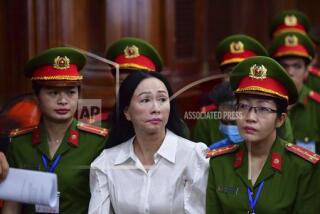Nguyen Chanh Thi, 84; general whose ’66 firing roiled S. Vietnam
Nguyen Chanh Thi, a South Vietnamese general whose dismissal in 1966 almost set off a civil war within the Vietnam War, died of heart ailments Saturday at a hospice in Lancaster, Pa. He was 84.
Thi, who oversaw the five northernmost provinces that made up the I Corps region of South Vietnam, had a reputation as an aggressive field commander and savvy political player who had a hand in the multiple coups and counter-coups of the mid-1960s.
President Nguyen Cao Ky, fearing him as a rival, mustered the support of most of the other South Vietnamese generals and fired Thi on March 10, 1966.
Within days, the streets of South Vietnamese cities, from Hue down the coast to Saigon, were filled with protesters and rioters.
Thi, one of the few Buddhists in a Catholic-dominated military elite, was a popular and powerful figure. Many people distrusted Ky because of government corruption and his unfulfilled promise to resign and allow a civilian government to be elected.
The U.S. government went along with Thi’s ouster, regarding him as being a “virtual warlord” and soft on communism because he favored negotiating with North Vietnam.
“It is a mistake to attribute the present crisis in the I Corps area to General Thi,” said a declassified CIA cable from that period. “Thi, in fact, is like a card player, placing his bets now on this leader, then on another; he plays his subordinates in the same manner. His only real objective is to continue the game.”
The riots continued for two months, until Ky sent troops to Da Nang. The uprising ended with hundreds of deaths.
Thi was deported to the United States and eventually settled in Pennsylvania.
Outspoken and still supported by Buddhists, he tried to return to his homeland in February 1972, but South Vietnamese troops surrounded his plane and prevented him from stepping on Vietnamese soil. He never disembarked, and the aircraft eventually took off.
Thi was born Feb. 23, 1923, in the former imperial capital city of Hue. He joined the army at 17 while the French ruled Indochina.
During World War II, he was a Japanese prisoner of war for several months until he escaped during a bombing raid. After the war, he was captured and imprisoned by the Viet Minh for three months, according to family documents.
After his release, he rose steadily in the army, helping President Ngo Dinh Diem defeat the opium-selling Binh Xuyen gangsters in 1955. Thi was promoted to colonel and commander of a paratrooper brigade.
But he became disillusioned with Diem and launched a coup attempt in November 1960. It failed and Thi fled to Cambodia, where he lived for three years until Diem was overthrown in a coup.
Survivors include his wife, Catherine Nguyen, and six children.
More to Read
Sign up for Essential California
The most important California stories and recommendations in your inbox every morning.
You may occasionally receive promotional content from the Los Angeles Times.










